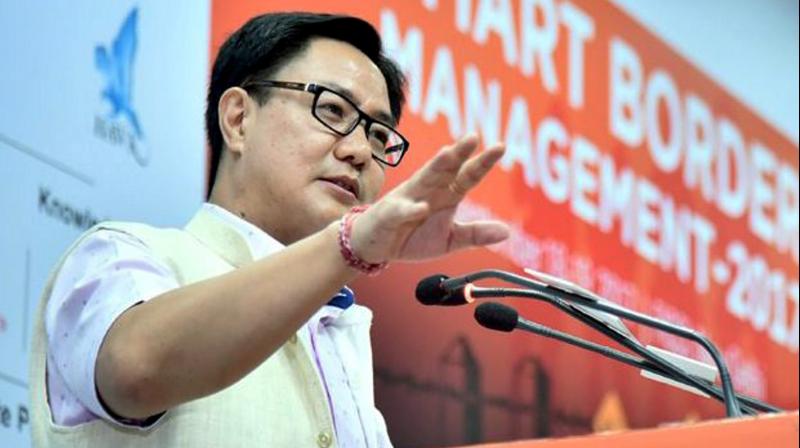
Kiren Rijiju slams Rahul, says he always questions Indian army
Since the Galwan valley clash between the Indian and Chinese soldiers, the govt has been facing a series of questions over the handling of the situation. Reacting to Rahul Gandhi's questions, Union Minister Kiren Rijiju lashed out at the leader and accused him of celebrating the death of Indian soldiers.

Since the Galwan valley clash between the Indian and Chinese soldiers, the government has been facing a series of questions over the handling of the situation.
Reacting to Congress leader Rahul Gandhi’s questions, Union Minister Kiren Rijiju lashed out at the leader and accused him of celebrating the death of Indian soldiers.
“Whenever India faces a military challenge, this man questions the army. Not surprising that he goes to JNU (Jawaharlal Nehru University) and sits with those who celebrate the death of our soldiers,” Rijiju said in a tweet as a response.
जब भी भारत के सामने कोई सैन्य चुनौती उत्पन्न होती है ठीक उसी समय यह आदमी सेना पर सवाल उठाता है। कोई आश्चर्य नहीं कि वह जेएनयू जाता है और उन लोगों के साथ बैठता है जो हमारे जवानों की मौत पर जश्न मनाते हैं। https://t.co/6VzgC7vrri
— Kiren Rijiju (@KirenRijiju) June 19, 2020
Rahul had while talking about the clash at Galwan said that it was “crystal clear” that the government was “fast asleep” for which the jawans had paid the price.
It’s now crystal clear that:
1. The Chinese attack in Galwan was pre-planned.
2. GOI was fast asleep and denied the problem.
3. The price was paid by our martyred Jawans.https://t.co/ZZdk19DHcG
— Rahul Gandhi (@RahulGandhi) June 19, 2020
“China has committed a grave crime by killing our unarmed soldiers. I want to ask who sent these bravehearts to danger without weapons and why? Who is responsible?” Rahul had asked via Twitter.
Earlier, External Affairs Minister S. Jaishankar had also replied to Rahul’s tweet saying all Indian troops guarding the border with China always carry arms.
The minister said armies of the two sides do not use firearms as per provisions of two bilateral agreements sealed in 1996 and 2005.
“Let us get the facts straight. All troops on border duty always carry arms, especially when leaving post. Those at Galwan on 15 June did so. Long-standing practice (as per 1996 & 2005 agreements) not to use firearms during face-offs,” Jaishankar tweeted.
Let us get the facts straight.
All troops on border duty always carry arms, especially when leaving post. Those at Galwan on 15 June did so. Long-standing practice (as per 1996 & 2005 agreements) not to use firearms during faceoffs. https://t.co/VrAq0LmADp
— Dr. S. Jaishankar (@DrSJaishankar) June 18, 2020
Twenty Indian Army personnel including a Colonel were killed in a violent clash between the two armies in Galwan Valley on Monday (June 15) evening.
The deaths on both sides happen to be the first set of casualties reported over the past four decades in the brewing conflict along the Line of Control.
China has not released any official casualty figures yet.
The whole ordeal began when China opposed India’s plan to lay a key road in the Finger area around the Pangong Tso Lake and the construction of another road connecting the Darbuk-Shayok-Daulat Beg Oldie road in Galwan Valley.
The road in the Finger area in Pangong Tso is considered crucial for India to carry out patrol.
India stated firmly that it would not stall any border infrastructure projects in eastern Ladakh in view of China’s protests.

